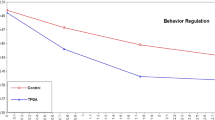Abstract
We report on two studies in which high school students who had been exposed to a cognitive training procedure known as the Conceptual Mediation Program (CMP) were compared to students who had not participated within the program. In the first study, based on data from two sites, it was found that 70 CMP students exhibited higher levels of school affect and strategy awareness than 103 comparable students not in the program. In the second study, based on retrospective data from one site, 53 students who had participated within CMP classes were found to exhibit higher levels of attainment on Year 12 South Australian public examination results (effect size of 1.04 on the aggregate). On the Year 12 examination results, the CMP students outperformed both the school and state norms.
Similar content being viewed by others
References
Baddeley, A. D. (1990). Human memory: Theory and practice. Hove, UK: Lawrence Erlbaum.
Chinn, C. A., & Brewer, W. F. (1993). The role of anomalous data in knowledge acquisition: A theoretical framework and implications for science instruction. Review of Educational Research, 63, 1–49.
Dawson, C., & Lyndon, H. (1997). Conceptual mediation: A new perspective on conceptual exchange. Research in Science Education, 27, 157–173.
Dempster, F. N., & Brainerd, C. J. (1995). Interference and inhibition in cognition. New York: Academic Press.
Dempster, F. N., & Corkill, A. J. (2000). Neo-interference research and the development of intelligence. In M. Anderson (Ed.), The development of intelligence (pp. 215–243). New York: Psychology Press.
Gauld, C. (1986). Models, meters, and memory. Research in Science Education, 16, 49–54.
Lyndon, H. (1989). I did it my way!: An introduction to “Old Way/New Way” methodology. Australasian Journal of Special Education, 13(1), 32–37.
Lyndon, E. H. (1998). Conceptual mediation program training guide. Department for Education and Children’s Services, South Australia. Available on www.southsupportservices.sa.edu.au/resources.htm
Lyndon, E. H. (2000). Conceptual Mediation: A new theory and a new method of conceptual change. Unpublished doctoral thesis, Department of Education, University of Adelaide. Available on www.southsupportservices.sa.edu.au/ resources.htm
Martin, M. O., Mullis, I. V. S., Gonzales, E. Z., Gregory, K. D., Smith, T. A., Chrostowski, S. J., et al. (2001). TIMSS 1999 international science report: Findings from IEA’s repeat of the third international mathematics and science study at the eighth grade [WWW document]. URL http://timss.bc.edu/timss1999i/science_achievement_report.html (accessed April 2003).
Pfundt, H., & Duit, R. (1994). Bibliography–Students’ alternative frameworks and science education (4th ed.). Kiel, Germany: IPN.
Postman, L., & Underwood, B. J. (1973). Critical issues in interference theory. Memory and Cognition, 1, 19–40.
Pressley, M., & McCormick, C. (1995). Advanced educational psychology. New York: Harper Collins.
Rennie, L. J., Goodrum, D., & Hackling, M. (2001). Science teaching and learning in Australian schools: Results of a national survey. Research in Science Education, 31, 455–498.
Rowell, J. A., Dawson, C. J., & Lyndon, E. H. (1990). Changing misconceptions: A challenge to science educators. International Journal of Science Education, 12, 167–175.
Underwood, B. J. (1957). Interference and forgetting. Psychological Review, 64, 49–60.
Author information
Authors and Affiliations
Rights and permissions
About this article
Cite this article
Yates, G.C.R., Lyndon, E.H. Conceptual Mediation Program in Practice: Educational Outcomes from Two Sites. Res Sci Educ 34, 389–401 (2004). https://doi.org/10.1007/s11165-004-1093-x
Issue Date:
DOI: https://doi.org/10.1007/s11165-004-1093-x




